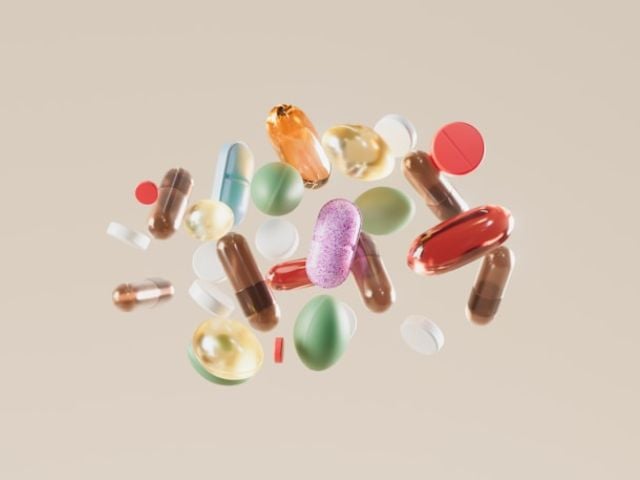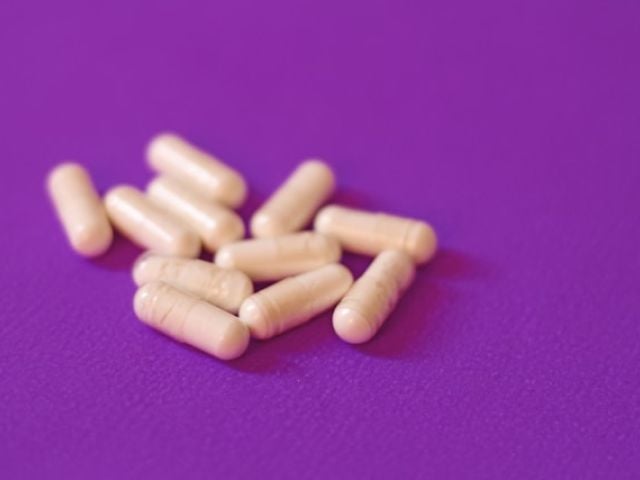
Reviewing Dr. David Sinclair’s Supplement Regimen in 2025
Dr. David Sinclair, Ph.D., is a professor of genetics at Harvard Medical School and one of the world’s foremost researchers on aging and longevity.
His work focuses on understanding why we age and finding ways to slow or reverse aging. Sinclair believes that aging isn’t just inevitable decline but a treatable condition—a biological process we might control through specific interventions.
The supplement routine described below is Dr. Sinclair’s personal protocol based on his understanding of current scientific research and compiled from his public comments in various interviews and podcast appearances.
Important Disclaimer: As a researcher with access to advanced testing and medical oversight, Dr. Sinclair’s choices reflect a higher risk tolerance than might be suitable for most people. This article examines his regimen but is not medical advice. Always talk to your doctor before starting any supplements.
David Sinclair’s Complete Supplement List in 2025
- Nicotinamide Mononucleotide (NMN): 1 gram daily
- Resveratrol: 1 gram daily with yogurt
- Spermidine: 1-2 mg daily
- Fisetin: 500 mg daily
- Vitamin D3: 4,000-5,000 IU daily
- Vitamin K2: 180-360 mcg daily
- Trimethylglycine (TMG/Betaine): 500-1,000 mg daily
- Omega-3 Fish Oil: Dosage not specified
- L-Taurine: 2 grams daily
- CoQ10: Dosage not specified in recent sources
- Metformin: 800-1,000 mg in the evening
- Low-Dose Aspirin: 83 mg daily
- Rapamycin: Dosage not publicly disclosed
The sections that follow will explore each supplement in detail, covering how they work, the evidence behind them, and practical considerations for anyone interested in longevity.
David Sinclair’s Core Anti-Aging Supplements

Four key supplements form the base of David Sinclair’s anti-aging routine, each targeting specific cellular aging processes.
These core compounds work together on different but related pathways – they boost NAD+ production, activate sirtuins, enhance autophagy (the body’s cellular recycling system), and help clear out harmful senescent cells.
Nicotinamide Mononucleotide (NMN)
- What It Is: NAD+ precursor that converts directly to NAD+ in cells. NAD+ is a critical coenzyme that declines with age and is involved in hundreds of metabolic reactions. NMN is one of several compounds that can replenish NAD+ levels, potentially counteracting this age-related decline.
- Sinclair’s Dosage: 1 gram daily, taken in the morning with yogurt to enhance absorption. Sinclair specifically mentions that the fat content in yogurt helps with bioavailability.
- Claimed Benefits: Supports cellular energy production through enhanced mitochondrial function. May improve DNA repair mechanisms, particularly important as these decline with age. Potentially enhances metabolic flexibility and glucose regulation. Sinclair also suggests it contributes to overall cellular resilience.
- Scientific Evidence: Multiple studies show promising results for metabolism1, physical performance2, and various aging markers3. Human clinical trials are limited but growing – several small studies show safety and modest metabolic improvements. The large, long-term human studies needed to validate lifespan or healthspan effects are still in progress or planning stages.
- Considerations: High cost (often $100+ monthly at Sinclair’s dosage). Bioavailability may be a challenge. Alternative NAD+ precursors like nicotinamide riboside (NR) have more human clinical data.
Is It Worth Including?: Yes, for those serious about longevity optimization. The promising research on cellular energy and metabolic health makes quality NMN supplements a worthwhile investment, especially for adults over 40 experiencing natural NAD+ decline.
Resveratrol
- What It Is: A natural compound found in red wine, grapes, and berries. Acts as a sirtuin activator, especially SIRT1 proteins that help maintain cellular health and longevity.
- Sinclair’s Dosage: 1 gram daily with yogurt or fat to improve absorption. Taken alongside NMN for potential synergistic effects.
- Claimed Benefits: Activates SIRT1 to boost cellular health and stress resistance. Resveratrol works with NMN to enhance mitochondrial function through increased NAD+. May improve heart health and reduce inflammation.
- Scientific Evidence: Results are mixed. Early studies in simple organisms showed promise, but mouse lifespan studies failed to confirm these benefits. Human studies show inconsistent results with only modest improvements.
- Considerations: Poor absorption is a major drawback, as most resveratrol breaks down quickly in the body. Supplement quality varies widely. Benefits may follow a U-shaped curve, making correct dosing important.
Is It Worth Including?: Possibly, but keep expectations realistic. While it hasn’t delivered dramatic longevity benefits, there’s some evidence for heart and metabolic improvements. Consider special formulations that improve absorption.
Spermidine
- What It Is: A natural compound found in foods like wheat germ, soybeans, aged cheese, and mushrooms. First discovered in semen (hence the name), but exists throughout the body and plants. Spermidine helps with cellular growth, maintenance, and controls autophagy.
- Sinclair’s Dosage: 1-2 mg daily as a supplement, though he recommends getting it from food when possible. This low dose reflects the small amounts naturally found in food.
- Claimed Benefits: Mainly promotes autophagy—the cellular “self-cleaning” process that removes damaged components. This process is key for cellular renewal and healthy aging. Also said to support DNA stability, reduce inflammation, and improve heart health.
- Scientific Evidence: Strong results in animals showing extended lifespan in yeast, flies, worms, and mice. Early human research shows promising links between spermidine intake and lower mortality, better brain function, and improved heart health, though large clinical trials are limited.
- Considerations: Food sources may offer additional benefits beyond supplements due to complementary compounds. Best therapeutic dose remains unclear. Safety profile looks good, but long-term supplement data is limited. Relatively affordable compared to other longevity supplements.
Is It Worth Including?: No, despite promising mechanisms and animal results, the human evidence isn’t strong enough to justify regular supplementation. Better to focus on spermidine-rich foods within a varied diet.
Fisetin
- What It Is: A natural senolytic compound found in fruits and vegetables like strawberries, apples, and cucumbers. Fisetin targets and removes “zombie” cells (senescent cells) that build up as we age and cause inflammation and tissue problems.
- Sinclair’s Dosage: 500 mg daily, taken regularly rather than in cycles. This is much higher than what you’d get from food alone, as it’s used for therapeutic purposes.
- Claimed Benefits: Mainly removes zombie cells that cause chronic inflammation. May improve aging tissues by clearing out these harmful cells. Also works as an antioxidant and might protect brain health.
- Scientific Evidence: Mouse studies show promising results for healthspan and reduced aging markers. It effectively cleared zombie cells in animal testing. Human studies are still limited but growing, with research exploring effects on various age-related conditions.
- Considerations: Sinclair switched from quercetin to fisetin because evidence shows it works better at removing zombie cells. Questions remain about whether daily use or occasional “cleansing” doses work better. The body doesn’t absorb it well, but taking it with fatty foods may help.
Is It Worth Including?: Yes, especially for people over 40 concerned about age-related inflammation. Among senolytic supplements, fisetin has a good safety record and growing scientific support. Removing zombie cells is a compelling way to address a key aging process.
Additional Supplements in Sinclair’s Routine
Beyond his core anti-aging compounds, Sinclair incorporates several additional supplements that support general health and may complement his longevity-focused interventions.
Vitamin D3 & K2
- What It Is: Two fat-soluble vitamins that work together in the body. Vitamin D3 is made when your skin is exposed to sunlight, while K2 comes mainly from fermented foods and animal products. They team up to help your body use calcium properly.
- Sinclair’s Dosage: 4,000-5,000 IU of Vitamin D3 daily and 180-360 mcg of Vitamin K2 daily. Sinclair prefers the MK-7 form of K2 because it stays in your body longer and is better absorbed than other forms.
- Claimed Benefits: Strengthens bones by directing calcium to the right places. Boosts immune system and reduces inflammation. Protects heart health by preventing calcium buildup in arteries. May also improve muscle strength, mood, and overall lifespan.
- Scientific Evidence: Strong support for health benefits, though specific longevity effects are less proven. Vitamin D deficiency is common and linked to many health problems. K2’s role in preventing unwanted calcification is well-supported by research, though fewer large clinical trials exist.
- Considerations: Blood tests can help determine your ideal vitamin D dose. Different forms are available (D2 vs D3, MK-4 vs MK-7). You may need to adjust dosage based on seasons and sun exposure. Take with meals for better absorption. If you take blood thinners, talk to your doctor before taking K2.
Is It Worth Including?: Yes, for most people. This pair is one of the most science-backed supplements with benefits that go beyond anti-aging. They’re generally safe and affordable, making them a smart addition to most supplement routines.
Trimethylglycine (TMG/Betaine)
- What It Is: A natural compound found in beets, quinoa, and spinach. Acts as a methyl donor supporting various body processes. Also known as betaine, it provides methyl groups needed for DNA and protein function.
- Sinclair’s Dosage: 500-1,000 mg daily, usually taken with NMN to prevent methyl group depletion. This matches dosages shown to provide metabolic benefits in studies.
- Claimed Benefits: Mainly helps control homocysteine levels, a risk factor for heart disease. Supports liver function and detoxification. May boost cellular energy and protect against certain stressors. Could prevent methyl depletion when taking NAD+ precursors.
- Scientific Evidence: Limited specific longevity data, but well-studied for metabolic health. Studies show benefits for liver function, heart health markers, and exercise performance. Research suggests combining NMN with TMG may enhance NAD+ precursor benefits.
- Considerations: May work well with NMN supplementation for those following Sinclair’s protocol. Generally safe but might cause digestive issues in some people. Those with certain genetic variations affecting methylation might benefit more.
Is It Worth Including?: Possibly, especially if taking NMN or other NAD+ precursors. The methylation support makes sense biologically, though direct evidence for longevity benefits is lacking. Affordable and safe, making it reasonable for comprehensive protocols.
Omega-3 Fish Oil
- What It Is: Essential fatty acids—mainly EPA and DHA—that come from marine sources like fatty fish. These polyunsaturated fats are key building blocks in cell membranes and help create molecules that control inflammation and other bodily processes.
- Sinclair’s Dosage: Not specifically stated in Sinclair’s published regimen, though he does include it. Most people take 1-3 grams of combined EPA/DHA daily, with higher doses sometimes used for specific health conditions.
- Claimed Benefits: Supports heart health by improving blood fat levels and blood vessel function. Helps brain health and possibly cognitive performance, especially as we age. Provides broad anti-inflammatory effects that may slow multiple aging processes. May improve how well cell membranes function.
- Scientific Evidence: Decades of research exist, though recent large studies show mixed results. There’s strong data on how it works and observational studies support benefits, but some clinical trials show modest or no effects for preventing problems. More consistent benefits are seen in people who already have health issues.
- Considerations: Quality varies greatly between products, with concerns about oxidation and contamination. Third-party testing for heavy metals is important. Some fishing practices raise sustainability concerns. Plant-based options (algae oils) provide DHA but usually less EPA.
Is It Worth Including?: Yes, but ideally through whole foods. Eating fatty fish 2-3 times weekly provides omega-3s plus other helpful nutrients. If you can’t eat enough fish, a high-quality supplement may help, especially if you have inflammation or heart risk factors.
L-Taurine
- What It Is: A conditionally essential sulfur-containing amino acid found mostly in animal tissues, especially the brain, heart, and muscles. Unlike typical amino acids, taurine doesn’t build proteins but performs many important functions, including fluid balance, calcium signaling, and protecting cells from damage.
- Sinclair’s Dosage: 2 grams daily, taken all at once. This is a newer addition to Sinclair’s routine, added after recent research suggested potential longevity benefits beyond its usual roles in heart and brain health.
- Claimed Benefits: Protects cells from various stressors. Supports mitochondria (cell powerhouses) and energy production. Helps maintain proper cell hydration and mineral balance. May improve exercise performance and recovery. Could protect against age-related drops in taurine levels.
- Scientific Evidence: Recent longevity research shows promising results, with studies showing increased lifespan in animals. Well-established benefits for heart health and metabolism. Clinical data supports its roles in blood sugar control, blood pressure management, and exercise capacity.
- Considerations: A newer addition to his longevity stack based on recent research. Generally very safe with few side effects even at higher doses. Relatively inexpensive compared to many longevity supplements. Natural levels decrease with age, making supplements potentially more useful for older adults.
Is It Worth Including?: Yes, especially given its excellent safety record, reasonable cost, and growing evidence for multiple health benefits. The combination of proven clinical uses and emerging longevity research makes taurine a sensible addition to a comprehensive regimen, especially for those over 40.
CoQ10
- What It Is: An antioxidant naturally made in our bodies that helps cells produce energy. CoQ10 (Coenzyme Q10) works as an electron carrier in mitochondria (our cells’ power plants) and protects against oxidative damage, especially in high-energy organs like the heart and brain.
- Sinclair’s Dosage: Not specifically listed in Sinclair’s recent published regimens, though he has mentioned it in broader discussions. Most supplements contain 100-300 mg for daily use, with higher amounts sometimes used for specific health conditions.
- Claimed Benefits: Supports cellular energy production and mitochondrial function. Protects cell membranes from free radical damage. May support heart health and muscle function. Could help offset the natural drop in CoQ10 levels that happens as we age.
- Scientific Evidence: Research shows mixed results. Strong evidence supports its role in energy production and as an antioxidant. Some promising studies for heart failure, muscle pain from statins, and exercise performance, but less consistent results for prevention or anti-aging effects.
- Considerations: Comes in two forms – ubiquinone and ubiquinol, with ubiquinol possibly being better absorbed, especially by older adults. Being fat-soluble, it’s absorbed poorly unless taken with fatty foods. May be particularly important for people taking statin medications.
Is It Worth Including?: Possibly, particularly for people over 50 or those on statins, which lower natural CoQ10 levels. Makes most sense for those with heart concerns or low energy. While not as cutting-edge as newer supplements, its strong safety record makes it worth considering.
Prescription Medications in Sinclair’s Protocol
Sinclair’s complete regimen includes medications that typically require medical supervision. While these compounds show promise in longevity research, they have important health risks.
We strongly advise caution and medical guidance before trying these interventions, even those available without prescription.
Metformin
- What It Is: A prescription medication first developed for type 2 diabetes that researchers are now studying for potential anti-aging benefits. This biguanide drug works mainly by decreasing liver glucose production, enhancing insulin sensitivity, and altering gut bacteria.
- Sinclair’s Dosage: 800-1000 mg taken at night. Sinclair occasionally stops taking it around heavy exercise periods due to concerns that it might interfere with workout adaptations.
- Claimed Benefits: Mimics some effects of calorie restriction by triggering AMPK, a cell energy monitor. May reduce inflammation, help insulin work better, and alter metabolic pathways involved in aging. Could offer protection against age-related diseases beyond just diabetes.
- Scientific Evidence: Strong data supports its safety and effectiveness for diabetes. Longevity evidence is growing but mainly consists of observational studies showing links to lower mortality and fewer age-related diseases. The TAME trial is currently studying metformin specifically for aging.
- Considerations: Requires a doctor’s prescription and ongoing medical oversight. Can deplete vitamin B12, requiring monitoring and possible supplements. Often causes stomach issues at first. May dampen some exercise benefits, though this remains debated.
Is It Worth Including?: No, except for those with diagnosed prediabetes, diabetes, or those in research studies. While showing potential, evidence for healthy aging benefits in people without diabetes remains early, and you need a prescription to obtain it. Better to focus on proven lifestyle approaches.
Low-Dose Aspirin
- What It Is: A common anti-inflammatory medicine that prevents blood clotting and reduces inflammation throughout the body. Low-dose means smaller amounts (81-100 mg) compared to regular strength aspirin used for pain relief.
- Sinclair’s Dosage: 83 mg taken daily without interruption. This matches typical heart-protective doses, though Sinclair has indicated he might adjust this practice as research continues to develop.
- Claimed Benefits: Mainly heart protection by preventing blood clots that cause heart attacks and certain strokes. May also help prevent some cancers, particularly colorectal cancer, and reduce ongoing inflammation that could contribute to aging.
- Scientific Evidence: Research understanding has changed significantly recently. Once broadly recommended for prevention, today’s guidelines only suggest it for specific higher-risk people. It remains valuable for those who already have heart disease.
- Considerations: Has important bleeding risks, including stomach and intestinal bleeding and hemorrhagic stroke, with dangers increasing with age. The risk-benefit balance has shifted as other preventive approaches have improved. Doctors no longer routinely recommend it for most healthy adults.
Is It Worth Including?: No, unless your physician specifically recommends it based on your personal health factors. Recent major studies show that for most people without existing heart disease, bleeding risks are greater than potential benefits. Decisions about aspirin therapy should be made with your doctor’s guidance.
Rapamycin
- What It Is: A powerful mTOR inhibitor first found in Easter Island soil bacteria, later used as an immunosuppressant medication. It blocks the mechanistic Target of Rapamycin (mTOR) pathway, which controls cell growth, metabolism, and aging in many species.
- Sinclair’s Dosage: Not fully revealed, though Sinclair has mentioned using intermittent dosing. Most longevity researchers test periodic doses (weekly or monthly) rather than daily use.
- Claimed Benefits: Works like caloric restriction by reducing mTOR signaling. Has extended lifespan in organisms from yeast to mice, showing some of the strongest effects of any treatment. May improve cellular cleanup, reduce inflammation, and enhance certain immune functions despite its immunosuppressive effects.
- Scientific Evidence: Strong animal data shows significant lifespan extension and health improvements. Human aging research is limited but growing, with small trials showing good safety and improved biomarkers. Extensive clinical experience exists in transplant medicine, though at higher doses.
- Considerations: Acts as a serious immunosuppressant at standard clinical doses, requiring doctor supervision. Experts debate the best dosing schedule for longevity benefits versus side effects. Possible issues include blood sugar changes, mouth sores, and higher infection risk. Requires prescription and monitoring.
Is It Worth Including?: No, except in clinical trials or under medical supervision. Despite strong animal results, human longevity evidence is still early, and the risks require careful oversight. It’s a promising future option but not currently suitable for self-administered longevity programs.
Scientific Basis for the Supplements David Sinclair Takes

Sinclair chooses supplements that target specific biological pathways involved in aging, though the scientific support varies:
NAD+ Precursors and Sirtuin Activation
NMN is the most thoroughly studied component of Sinclair’s regimen in human trials. This NAD+ precursor helps counteract the natural decline of cellular NAD+ as we age.
Studies show NMN has many promising benefits, ranging from metabolic health improvements to aerobic capacity. Sinclair combines NMN with resveratrol based on the theory that resveratrol activates sirtuins (especially SIRT1), which need NAD+ to function.
However, resveratrol’s effectiveness remains debated, with research reproducibility issues and unsuccessful mouse lifespan studies.
Why David Sinclair Prefers NMN Over NR
Dr. David Sinclair favors NMN over NR because unpublished research showed NMN boosted exercise ability in mice by 50% (they ran much farther), while NR had no effect at the same dose. He also prefers NMN because it converts to NAD+ in just one step using a specific transporter, which might make it more efficient than NR.
Senolytic Approach
Sinclair uses fisetin as part of the growing interest in senolytic compounds that remove senescent “zombie” cells.
These damaged cells build up with age and release inflammatory substances that harm nearby tissues. Animal research suggests clearing these cells may delay age-related conditions, though human evidence is still early.
Metabolic Regulators
Sinclair includes metformin for its ability to mimic some effects of caloric restriction by influencing metabolism and reducing inflammation.
While well-studied for diabetes, human longevity data on metformin is limited. The ongoing TAME trial4 may provide clearer evidence about its effects on healthspan in people without diabetes.
Supporting Nutrients
Vitamins D3 and K2, omega-3 fatty acids, and other supplements in Sinclair’s regimen have established roles in maintaining overall health, though their specific contributions to longevity are less clear.
These compounds mainly ensure various biological systems function optimally rather than directly targeting aging processes.
Dr. Sinclair’s Other Daily Habits for Longevity

Beyond supplements, Dr. Sinclair follows these key lifestyle practices as the foundation of his longevity approach:
- Intermittent Fasting: Sinclair eats all his meals within an 8-10 hour window each day. This eating pattern activates cellular cleanup processes like autophagy and mimics the benefits of eating fewer calories.
- Exercise Routine: He combines strength training to maintain muscle, cardio workouts, and short bursts of intense exercise (HIIT) to improve mitochondrial function. He sometimes skips his metformin dose around workouts to avoid blocking exercise benefits.
- Sleep Optimization: Sinclair aims for 7-8 hours of quality sleep each night and keeps consistent bedtimes. He aligns his sleep schedule with his body’s natural rhythms, avoids blue light before bed, and keeps his bedroom cool and dark.
- Stress Management: He practices meditation and mindfulness to reduce the aging effects of ongoing stress.
Many researchers agree these basic lifestyle habits provide major longevity benefits, with supplements only adding minor improvements to this strong foundation.
How to Approach Sinclair’s Protocol Responsibly
Sinclair’s regimen should be viewed as a personal case study rather than a universal prescription for longevity.
For those interested in a similar approach, consider these guidelines:
Begin with the components having strongest scientific support: vitamins D3 and K2, omega-3 fatty acids, and possibly NMN for those over 40. These have established safety profiles and reasonable evidence for health benefits.
Work closely with healthcare providers who can monitor potential interactions and side effects, especially before considering prescription medications like metformin or rapamycin, which carry significant risks when used off-label.
Use objective testing to track effects through relevant biomarkers like inflammatory markers, glucose metabolism, and lipid profiles. This data-driven approach aligns with Jinfiniti’s T-A-O (Test, Act, Optimize) philosophy.
Conduct a cost-benefit analysis when prioritizing interventions. A comprehensive NMN and resveratrol regimen can cost hundreds monthly, while lifestyle improvements offer substantial benefits at minimal expense.
Personalize based on your health status. Your genetic background, existing conditions, and health goals should guide which interventions make sense for you, as aging biology varies significantly between individuals.
Add 20+ Healthy Years to Your Life
Access the same health optimization strategies used by longevity experts. Weekly insights, exclusive products, member pricing.
Referenced Sources












